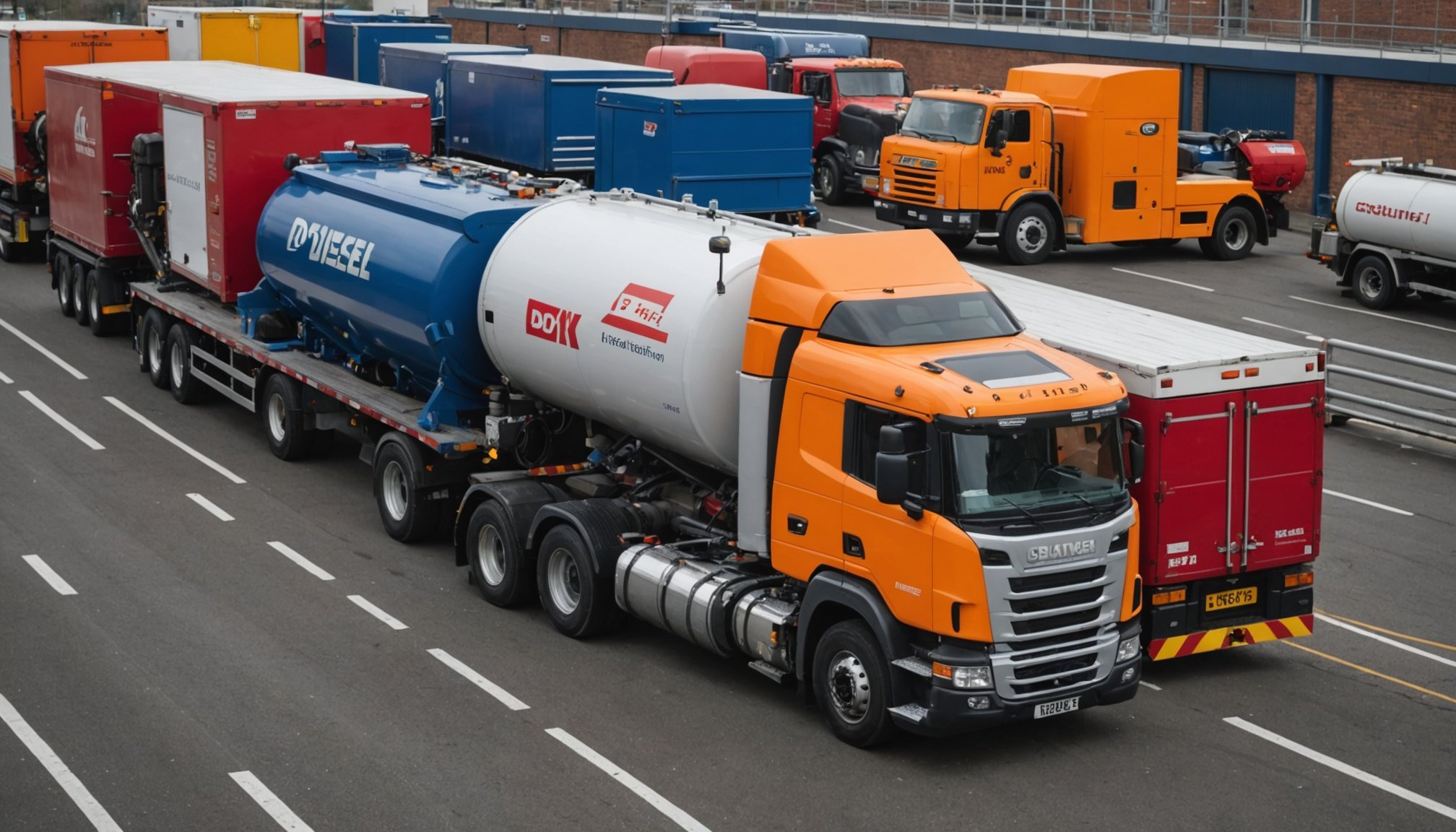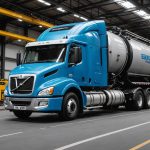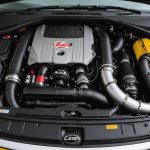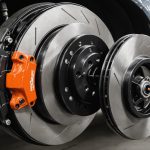Unlocking Optimal Fuel Economy: Proven Strategies for Upgrading Diesel Truck Injection Systems in the UK
The Importance of Fuel Efficiency in Diesel Trucks
In the UK, where transportation is a significant contributor to carbon emissions, optimizing the fuel economy of diesel trucks is more crucial than ever. With the country aiming for a net zero carbon economy by 2050, the focus on improving fuel efficiency in the transportation sector has intensified. Here, we delve into the proven strategies for upgrading diesel truck injection systems to achieve better fuel economy.
Understanding Diesel Engine Technology
Before diving into the strategies, it’s essential to understand the basics of diesel engine technology. Diesel engines rely on the principle of compression ignition, where the fuel is injected into the combustion chamber at the right moment to ignite. The efficiency of this process is heavily dependent on the injection system.
Also to see : Ultimate handbook for hydraulic brake care in uk commercial trucks: proven strategies for peak performance and durability
Role of Turbocharging and Hybrid Systems
Turbocharging is a common method to enhance the power output of diesel engines. However, traditional turbochargers can be inefficient at low engine loads. Recent studies have shown that electric hybridization in the air-charging system can significantly improve fuel efficiency, especially at low loads. For instance, an electric hybrid system can provide additional energy to the compressor, reducing fuel consumption by optimizing the air-to-fuel ratio and improving combustion efficiency[1].
Optimizing Engine Parameters for Better Fuel Economy
Optimizing engine parameters is a critical step in enhancing fuel efficiency. Here are some key strategies:
Adjusting Air-to-Fuel Ratio and Valve Timing
Adjusting the air-to-fuel ratio to achieve faster combustion can increase close-cycle efficiency, reducing fuel consumption by up to 8.8%. Additionally, re-tuning the valve timing to create a Miller effect can increase efficiency by reducing the intake valve opening time without sacrificing the air mass-flow rate, thanks to increased boost pressure[1].
Resizing Turbomachines
At mid and high engine loads, resizing the turbomachine is necessary for further improvements in fuel efficiency. A fully optimized turbocharger can provide greater benefits due to reduced losses, making it a worthwhile investment for long-term efficiency gains[1].
Winter Preparation and Maintenance
Winter conditions can be particularly harsh on diesel engines, affecting fuel efficiency and overall performance. Here are some essential tips for preparing your diesel truck for winter:
Replacing Fuel Filters and Using Winter Additives
Replacing fuel filters before winter ensures that the fuel system remains clear and efficient. Diesel fuel is prone to gelling in cold temperatures, which can block fuel lines and filters. Using a high-quality winter diesel additive can prevent gelling, improve cold-weather starts, protect against corrosion, and enhance fuel economy[2].
Maintaining Block Heaters
Block heaters are vital for diesel engines in freezing conditions. They pre-warm the engine’s coolant and/or oil, facilitating easier starts and reducing engine wear. Using a block heater can offer faster warm-up times, improved fuel efficiency, and reduced strain on the battery[2].
Driving Habits and Fleet Management
Driving habits and fleet management practices play a significant role in fuel efficiency.
Efficient Driving Habits
Encouraging smoother, steadier driving habits can significantly reduce fuel consumption. For example, engines are most efficient at about 60 mph, and for every 5 mph over this limit, fuel efficiency drops by 6%. Additionally, excessive idling wastes fuel and increases engine wear; implementing telematics systems can help enforce compliance with idling laws and promote more efficient driving habits[3].
Fleet Management Software and Fuel Cards
Using fleet management software and fuel cards can help monitor fuel usage and mileage, identify drivers or routes that consume the most fuel, and streamline fuel data. This can lead to significant cost savings and improved fuel efficiency. For instance, fuel cards can offer discounts per liter, and premium fuels can occasionally be used to clean fuel injectors, improving fleet longevity and fuel efficiency[5].
Collaborative Transport Optimization
Collaborative transport optimization is another strategy that can help reduce fuel consumption and emissions.
Matching Vehicle Capacity with Shipment Needs
By matching vehicle transport capacity with shipment needs, companies can decrease overall transport costs, improve vehicle fill rates, and achieve significant carbon savings. For example, a pilot program with AF Blakemore showed potential to optimize the use of existing vehicles, reducing transport costs by 37%, improving vehicle fill rates by 9%, and achieving carbon savings of 15-30%[4].
Transitioning to Alternative Fuels and Technologies
As the UK moves towards a net zero carbon economy, transitioning to alternative fuels and technologies is becoming increasingly important.
Electric and Hydrogen Vehicles
Electric vehicles (EVs) and hydrogen fuel cell vehicles are gaining traction. While EVs have a more expensive upfront cost, they are cheaper to maintain and offer significant long-term savings. Hydrogen energy, though still in its infancy, holds promise for the future of transportation. Companies like AF Blakemore and Warburtons are already introducing electric HGVs into their fleets, marking a step towards a more sustainable transportation sector[4].
Practical Insights and Actionable Advice
Here are some practical insights and actionable advice for fleet managers and diesel truck owners:
Key Strategies for Improving Fuel Efficiency
- Optimize Engine Parameters: Adjust air-to-fuel ratios and valve timing to improve combustion efficiency.
- Use Electric Hybrid Systems: Implement electric hybridization in the air-charging system to enhance fuel efficiency at low loads.
- Maintain Vehicles: Regularly replace fuel filters, use winter additives, and maintain block heaters to ensure optimal performance in all conditions.
- Promote Efficient Driving Habits: Use telematics systems to monitor and improve driving habits, reducing excessive idling and speeding.
- Implement Fleet Management Tools: Utilize fleet management software and fuel cards to monitor and optimize fuel usage.
- Transition to Alternative Fuels: Consider introducing electric or hydrogen vehicles into your fleet for long-term sustainability and cost savings.
Detailed Checklist for Winter Preparation
- Replace Fuel Filters: Ensure the fuel system remains clear and efficient.
- Use Winter Diesel Additives: Prevent fuel gelling and improve cold-weather starts.
- Maintain Block Heaters: Pre-warm the engine’s coolant and/or oil for easier starts and reduced engine wear.
- Check and Replace Oil Filters: Ensure proper lubrication and protection for the engine.
- Inspect Belts and Batteries: Prevent performance issues and costly repairs.
Improving fuel efficiency in diesel trucks is a multifaceted challenge that requires a combination of technological upgrades, maintenance practices, and efficient driving habits. By optimizing engine parameters, preparing vehicles for winter, promoting efficient driving habits, and transitioning to alternative fuels, fleet managers and diesel truck owners can significantly reduce fuel consumption and contribute to a more sustainable transportation sector.
As Lawrence from the Department for Transport notes, “Aiming for a fully decarbonised economy, the first curve you hit on is efficiency, then you get into more green energy and vehicles, but that’s going to take 10-15 years. Unless you do some of these efficiency initiatives first, I seriously don’t think we’ll hit the emissions targets we’re setting ourselves.”[4]
By adopting these proven strategies, we can unlock optimal fuel economy, reduce carbon emissions, and pave the way for a more sustainable future in the UK’s transportation sector.
Table: Comparative Benefits of Different Fuel Efficiency Strategies
| Strategy | Benefits | Potential Savings |
|---|---|---|
| Electric Hybridization | Improved fuel efficiency at low loads, reduced emissions | Up to 8.8% fuel reduction[1] |
| Optimizing Engine Parameters | Improved combustion efficiency, reduced fuel consumption | Up to 12% fuel reduction[1] |
| Winter Preparation | Prevent fuel gelling, improved cold-weather starts, reduced engine wear | Improved fuel efficiency, reduced maintenance costs[2] |
| Efficient Driving Habits | Reduced fuel consumption, lower emissions | Up to 6% fuel efficiency drop per 5 mph over 60 mph[3] |
| Fleet Management Software | Monitored fuel usage, streamlined data, cost savings | Significant cost savings, improved fuel efficiency[5] |
| Collaborative Transport Optimization | Reduced transport costs, improved vehicle fill rates, carbon savings | 37% transport cost reduction, 15-30% carbon savings[4] |
| Transition to Alternative Fuels | Long-term cost savings, reduced emissions | Cheaper maintenance, significant long-term savings[4] |
Quotes and Insights
- “The simplest and most common marine propulsion matching is free-floating without waste-gate valves, matched for a nominal engine operating point (100% of load and 100% of speed). Any other operating point is considered a trade-off in efficiency.”[1]
- “Using a block heater offers several advantages: faster warm-up times, improved fuel efficiency, and reduced strain on the battery.”[2]
- “Encouraging smoother, steadier driving habits reduces these expenses while making roads safer for everyone.”[3]
- “Unless you do some of these efficiency initiatives first, I seriously don’t think we’ll hit the emissions targets we’re setting ourselves.”[4]
By integrating these strategies and insights, we can move closer to achieving optimal fuel economy and a more sustainable transportation sector in the UK.











